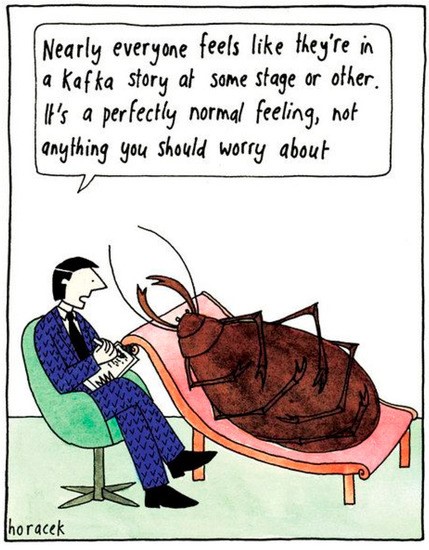Blog by Cormac Francis Mullins and JJ Coughlan
During the early stages of the coronavirus pandemic, it was difficult not to experience a sense of claustrophobia. Confined to one’s room and sequestered from society and family, the dystopian universe we had been faced with felt oppressive and nightmarish. In many senses, it felt “Kafkaesque.” As such, we undertook to utilize this period of solitary confinement as an opportunity for immersion in the writings of Franz Kafka in the hope of transcending this disconcerting reality and attaining a new enlightened outlook.
The Metamorphosis
Arguably Kafka’s most notable work, The Metamorphosis recounts the story of Gregor Samsa, a salesman who wakes up one morning to find he has been transformed into a ‘monstrous vermin’. Samsa’s emotional and psychological turmoil in response to this has been mirrored across society: “I cannot make you understand. I cannot make anyone understand what is happening inside me. I cannot even explain it to myself.”

This absurd situation has reflected the personal and societal deconstruction that has taken place with the global pandemic. Like Samsa, we may think “‘What if I went back to sleep for a while, and forgot about all this nonsense?’” We have all awoken to a bewildering landscape that has been inexplicably altered. Work practices have been overhauled. Many have been segregated and quarantined in their rooms much like Samsa. Our new world order appears to straddle fantasy and reality.
This upheaval can be a traumatic experience, with many of us experiencing feelings of confusion and despair. We may even wish to hiss with “impotent fury.” Loss of routine can precipitate emotional fluctuations that can occur throughout any transformation.[1] This can jolt us into uncertainty and cause us to lose our sense of identity. Samsa wondered, “‘What now?’ … and looked around in the dark.” This powerlessness and alienation ultimately lead to Samsa’s demise; “his head involuntarily dropped, and his final breath passed feebly from his nostrils.”
The Trial
The turmoil wreaked upon our lives by the virus has parallels to Kafka’s The Trial, where Josef K, a bank cashier, is persecuted by a remote, inaccessible authority. The novel depicts a tyranny which appears capricious, irrational, and incomprehensible. The more Josef K tries to escape its grasp, the more he becomes enmeshed in its web. K’s plea of “but I’m not guilty” is met with the response, “that is how the guilty speak”. It speaks of the terror of dealing with a force that does not play by the rules through which one interprets the world.
The unpredictability and absurdity have been mirrored by our current predicament. This ‘invisible enemy’ has immobilized our healthcare systems and threatened our ability to provide care. It has dismantled our assumptions and exposed the structures that have previously governed our lives as fickle and decrepit.
This discontinuity can cause confusion and disorientation, whereby “the right understanding of any matter and a misunderstanding of the same matter do not wholly exclude each other.” In the face of such disorder, we are forced to re-examine, recalibrate, and realize that “you don’t have to consider everything true, you just have to consider it necessary.”
New Perspectives
Turmoil, upheaval and isolation are ubiquitous throughout the writings of Kafka. These themes are experienced by many, not least throughout the COVID-19 pandemic, and are an inescapable part of the human condition. In difficult times such as these, we must strive “to learn how to deal with the situation as it is” and tend to that within our immediate sphere of control. This requires a strong sense of self and societal awareness, in order to recognize where we, and those around us, are on this emotional journey.
The COVID-19 pandemic can be a disorienting experience. It is tempting to try to explain these events and extract a fundamental ‘truth’ from the experience. To Kafka, this essential truth does not exist. Rather, multiple possibilities for interpretation exist simultaneously. Perhaps we can attain deliverance by extracting our bias and finding a fresh perspective. Kafka writes in his parable, ‘The Trees’:
“For we are like tree trunks in the snow. In appearance they lie sleekly and a little push should be enough to set them rolling. No, it can’t be done, for they are firmly wedded to the ground. But see, even that is only appearance.”
The structures of our healthcare system, society, and self have always been “firmly wedded to the ground”; however, the coronavirus pandemic has brought the realization that “even that is only appearance.” The turbulence of the pandemic has eroded these social constructs, exposing them as vulnerable with, “a little push…enough to set them rolling.” The resulting feelings of estrangement and helplessness force us to confront our fate in much the same way as Gregor Samsa and Josef K. There is consolation in realizing that their alienation was not solitary but instead part of a universal experience. In uncovering these common roots, we can understand that this struggle is part of a shared humanity. We can utilize this period of chrysalis for re-orientation, since competing perspectives are equally “only appearance.” We can choose to stand upright again “like tree trunks in the snow.” In this way, the chaos and confusion of change can represent an opportunity for positive growth and evolution rather than the threat of a dark Kafkaesque metamorphosis.
Dr Cormac F Mullins MB, FCAI, MSc (Twitter: @cormac_mullins) is a fellow in pain medicine and anaesthesiology with a master’s qualification in health services management. Dr JJ Coughlan MB, MRCP is a medical doctor, specializing in cardiology. Both authors are currently working in St James’s Hospital, Dublin, Ireland.
Notes
[1] Fisher J. The process of transition (Fisher’s Personal Transition Curve). 2012.
Bibliography
Kafka, Franz. 1996. The Metamorphosis and Other Stories. New York: Barnes & Noble Books.
Kafka, Franz. 2009. The Trial. New York: Oxford world’s classics.